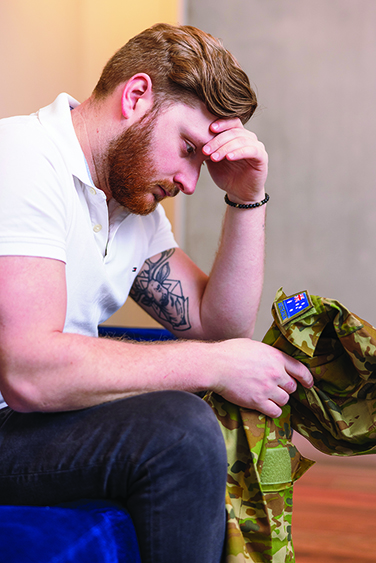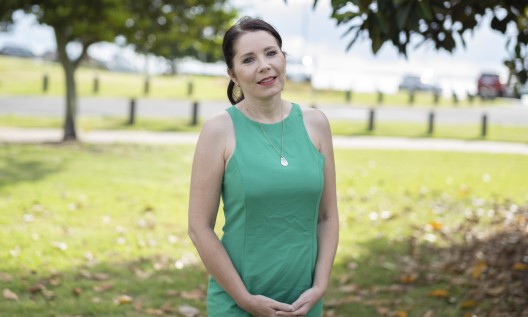Growing awareness of moral injury

Dr Nikki Jamieson tragically lost her 21-year-old son Daniel Garforth to suicide in 2014. A Private in the Army, Daniel was struggling with the way he was being treated at work.
As a result of his death, Dr Jamieson became a suicidologist and now works on suicide prevention at the Department of Defence. She believes that while suicide is very complex, moral injury (MI) may have contributed to her son’s decision to take his life.
Dr Jamieson was among several grieving parents who pushed for the Royal Commission into Defence and Veteran Suicide, at which she also gave evidence.
‘We shouldn’t be losing so many veterans to suicide,’ she says. ‘[But] I’m looking forward to the final recommendations and the positive change they will bring, and I hope that at least one will have a focus on moral injury.’
Mental health professionals worldwide are taking an increasing interest in MI. The ADF defines it as a trauma-related syndrome caused by the physical, psychological, social and spiritual impact of grievous moral transgressions, or violations of an individual’s deeply held moral beliefs and/or ethical standards. It can be caused by an individual perpetrating, failing to prevent, bearing witness to, or learning about inhumane acts that result in the pain, suffering or death of others.
MI can also be caused by betrayal by trusted individuals in legitimate authority, as well as systems and bureaucracies.
MI manifests in symptoms such as shame, guilt, self-loathing, sadness, anxiety and disgust; beliefs about being bad, damaged or unworthy; loss of faith in people; avoidance of intimacy; and loss of religious faith, or loss of faith in humanity or a just world.
Professor Andrea Phelps, Deputy Director of Phoenix Australia – Centre for Posttraumatic Mental Health, has also conducted research into MI. She notes that the increasing interest in MI is in part due to recent wars like those in Iraq and Afghanistan. ‘The nature of those insurgency operations meant that military personnel were faced with many moral conflicts and ethical dilemmas,’ she says.
This view is shared by Repatriation Commissioner Kahlil Fegan DSC AM who in a recent speech pointed out that ‘Moral injury is becoming increasingly recognised as something anyone providing services to veterans needs to properly understand.’
MI was first noticed in the 1980s by American psychiatrist Jonathan Shay who treated Vietnam veterans. It was he who coined the term. Research tells us there is a definite relationship between MI and suicide- related behaviour. And PTSD can increase the symptoms of MI, some of which overlap with PTSD.

Dr Jamieson points out that MI is often misdiagnosed as PTSD, which means affected veterans are not always getting the most suitable treatment and support.
‘PTSD is built around a fear-model,’ adds Professor Phelps. ‘What’s become increasingly recognised is that that’s only one component and that in many cases there’s a moral dimension. What we don’t know is the extent to which MI is associated with PTSD versus the extent to which it’s stand-alone.’
So, research is key. Recently, Professor Phelps took part in an international collaborative project the Australian element of which was funded by DVA. It led to the creation of the Moral Injury Outcome Scale (MIOS), which is available on the Open Arms – Veterans & Families website (openarms.gov.au and search for ‘moral injury’).
She says the MIOS is a reliable diagnostic tool and measure that will be useful for future research, and is pleased that it’s getting traction throughout the mental health community.
Meanwhile, treatment for MI is available. Dr Jamieson explains that there are 2 main treatments in Australia. One is called acceptance/ commitment therapy and the other is adaptive disclosure therapy.
‘Treating moral injury is about supporting people as they learn to deal with and manage their new normal, and to help them make meaning and purpose from their experience,’ she says. ‘The treatment offered to people with MI … helps validate their experience and to forgive themselves and others. Defence is doing some really great work and the Royal Commission will help us in further shaping some of that work.’

We do not know how many serving and ex-serving ADF personnel suffer from MI, though ADF chaplains, and Veterans' Chaplains as part of the Veterans' Chaplaincy Pilot Program, now receive MI skills training that includes a focus on the pastoral or spiritual elements of MI.
‘We’re talking “spiritual” in the broadest sense,’ says Professor Phelps. ‘For some people that will involve religious beliefs, for others it can change their understanding of the nature of humanity, or more broadly the meaning of life. This focus on spirituality sets moral injury apart from other mental health disorders, and may need a different approach to treatment.’
MI will be incorporated in future action plans under the soon to be released Defence and Veteran Mental Health and Wellbeing Strategy 2024–2029, which is being developed by DVA and Defence.
If you are experiencing distress, contact Open Arms – Veterans & Families Counselling on 1800 011 046 (24/7). Open Arms clinicians can provide effective interventions for the treatment of MI. Dr Jamieson’s views are her own and do not necessarily reflect the views or policies of the Australian Government or the Department of Defence.
Images:
Dr Nikki Jamieson
Professor Andrea Phelps
